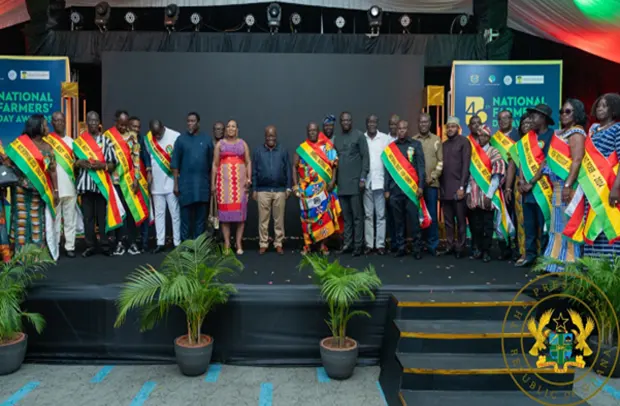President Akufo-Addo with the winners
AS PART of the government’s effort to improve the living conditions of cocoa farmers, President Akufo-Addo has announced free tertiary education scholarships for wards of cocoa farmers across the country.
“Today, I’ve directed COCOBOD to provide scholarships to every cocoa farmer’s child at the tertiary level,” said President Akufo-Addo in his keynote address at this year’s National Farmers’ Day celebration in Accra, marking its 40th edition.
“This means that all wards of cocoa farmers qualify for free tertiary education through the Cocoa Scholarship programme. Unlike previously, cocoa farmers are now registered on the cocoa management system and their trades are tracked, so it is easy to tailor it [the scholarship] for cocoa farmers.”
President Akufo-Addo also announced that he has, on the advice of the Producer Price Review Committee, increased the producer price of cocoa from ₵48,000 to ₵49,600 per tonne, or from ₵3,000 per bag to ₵3,100 per bag.
This, he explained, is a result of his instructions to the minister to ensure that there are periodic reviews to restore farmer incomes as the market changes.
Climate Resilience
Speaking on the theme: “Building Climate-Resilient Agriculture for Sustainable Food Security,” President Akufo-Addo said his government, having recognised the vulnerability of Ghana’s farmers, has made significant investments in irrigation infrastructure across the country including the development of irrigation facilities in the Northern, Upper East, Upper West, and Eastern regions, under the second phase of the Planting for Food and Jobs (PFJ2.0) flagship programme, covering a total area of 4,870 hectares.
“These irrigation facilities” he underscored, “will allow farmers to cultivate crops even during dry seasons, reducing their dependence on rainfall and helping to ensure consistent food production throughout the year.”
He added that the government was also advancing new solutions through solar-powered irrigation systems with the construction of some 232 solar-powered borehole that will irrigate 3,144 hectares of farmland currently underway.
Additionally, he said the government, through its research partnerships and collaboration with agricultural institutions, is investing in the development and distribution of drought-resistant and heat-tolerant crop varieties which are specifically bred to thrive under the challenging conditions posed by climate change.
President Akufo-Addo further intimated that recognising the importance of building community resilience, the government has launched several training programmes aimed at empowering farmers with climate-smart agricultural techniques which would also equip them with the requisite skills in learning how to adapt their planting schedules, manage water resources, and implement conservation practices that mitigate the impact of climate change.
“By building a network of well-informed, climate-resilient farmers, we’re creating a community that is better prepared to tackle climate-related challenges together,” he opined.
President Akufo-Addo also noted that in response to food spoilage due to changing weather patterns, “We have invested in building aggregation centers and packhouses across the country to provide farmers with modern, climate-constructive facilities for storing their produce” while working on establishing a 6,000-metric-ton silo facility in the Eastern Region, aimed at storing staple crops, such as maize and rice, as part of our strategic grain reserve programme.
“Building climate-resilient agriculture is not a one-time effort, but a continuous, holistic approach to safe guarding our future. We’re committed to creating an agricultural system that can withstand the trials of climate change by investing in water management, soil health, climate-resilient crop varieties, integrated pest management, community resilience, agro forestry, and post-harvest infrastructure.
“We’re positioning Ghana to become a model of climate-smart agriculture on the African continent. With these efforts, we’re laying the foundation for a resilient Ghana, a Ghana that can produce her own food, support her own people, and protect the livelihoods of those who have dedicated their lives to feeding our nation,” he stated.
BY Nii Adjei Mensahfio


